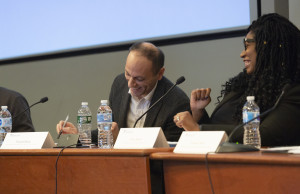Red Lines, Red Tape
On February 5, the University of Pennsylvania Journal of Law & Public Affairs hosted a day-long symposium, “Red Lines, Red Tape,” which delved into the issues of housing discrimination and unaffordability at the local and national levels. Organized with the support of the University of Pennsylvania Carey Law School’s Leo Model Government Service & Public Affairs Initiative, the Weitzman School of Design, and the Graduate and Professional Student Assembly, the symposium welcomed speakers from private and public sectors, as well as journalists, politicians, lawyers, researchers, and academics.
Wendell Pritchett, Provost of the University of Pennsylvania, Presidential Professor of Law and Education, and a noted housing expert, opened the event with remarks on the current state of housing in Philadelphia. The keynote address was delivered by Matthew Desmond, author of Evicted: Poverty and Profit in the American City and the Principal Investigator of the Eviction Lab at Princeton University. Desmond shared recent empirical research from the Eviction Lab, which collects nationwide data on evictions, and some of the startling findings he and his group have found regarding regional differences in eviction trends. Desmond emphasized the need for more data so that policymakers can craft solutions tailored to local demands.
Building on the topics covered by Desmond, the first panel addressed housing discrimination and the challenges of enforcement. Moderated by Norrinda Hayat, Clinical Professor and Director of the Civil Justice Clinic at Rutgers Law, this panel included Gustavo Velasquez, Director of Urban–Greater DC at the Urban Institute and former Assistant Secretary for Fair Housing and Equal Opportunity at HUD; John Relman, Founder and Managing Partner of Relman Colfax PLLC in Washington, D.C.; Rasheedah Phillips of the Shriver Center on Poverty Law in Chicago; and George Donnelly, an Independence Foundation Fellow at the Public Interest Law Center in Philadelphia. Noting the myriad factors involved in housing discrimination, the panelists focused on the new challenges they face in the field, including regulatory changes and artificial intelligence in the banking industry. The panel emphasized the need for more lawyers in the housing field and implored the Penn Law students in the crowd to get involved.
The lunchtime panel, which focused on Philadelphia housing issues, featured a conversation between Jake Blumgart, a journalist for WHYY PlanPhilly, and Helen Gym, Philadelphia Councilmember At-Large. Councilmember Gym spoke about the challenges of creating legislation for disparate constituents who have diverse needs and face a range of housing issues. The Councilmember also discussed the balance of making policies that support growth and development while protecting vulnerable residents, which—for Gym—started with a simple but important policy change: the right to counsel. This new policy guarantees free legal representation for renters under 200% of the federal poverty guideline ($33,820 for a household of two) when they are going through eviction hearings.
After the lunch hour discussion, Oscar Abello, a reporter for NextCity, moderated a panel that grappled with the question of how to develop affordable housing. Panelists Anne Fadullon, the Director of Planning and Development for the City of Philadelphia; Celia Smoot, Vice President of the National Affordable Housing Trust; Vincent Reina, Assistant Professor in the Department of City and Regional Planning at University of Pennsylvania; and Edward Pinto, Director of the Housing Center at the American Enterprise Institute, engaged in a spirited discussion of potential solutions to expand housing development. The panel explored historic government policies that continue to shape affordable housing today and how they can be improved. The panelists differed in their approaches, but all agreed that the country’s current stock of affordable housing fails to meet pressing demand.
The final panel addressed historic segregation and how society can move toward a more inclusive future. The discussion was moderated by Akira Drake Rodriguez, Lecturer at the Department of City and Regional Planning at the University of Pennsylvania Stuart Weitzman School, and featured panelists Sheryll Cashin, Carmack Waterhouse Professor of Law, Civil Rights and Social Justice at the Georgetown University Law Center; Andre Perry, Metropolitan Policy Program Fellow at the Brookings Institution; and Ingrid Gould Ellen, Paulette Goddard Professor of Urban Policy and Planning and Faculty Director at the NYU Furman Center for Real Estate and Urban Policy. Touching on recent research in the field, the panelists spoke at length about the ways in which racism and segregationist policies continue to influence our housing decisions today. However, the panel ended the day on an optimistic note by discussing what inclusive growth in the housing market could look like and the different policies that could help achieve it.
Recommended reading based on symposium discussions
The symposium covered a wide range of topics relating to housing discrimination, affordable housing development, and residential segregation. To further investigate this topic, please explore this non-exhaustive list of recommended publications from our panelists:
Matthew Desmond, Evicted: Poverty and Profit in the American City (2016).
Sheryll D. Cashin, Loving: Interracial Intimacy in America and the Threat to White Supremacy (2017).
Andre M. Perry, Know Your Price: Valuing Black Lives and Property in America’s Black Cities (2020).
















